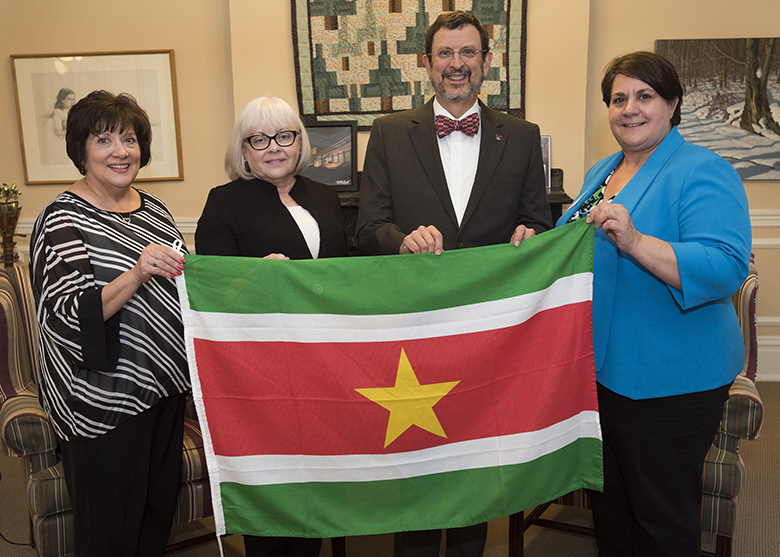
A trio of faculty members from Indiana University of Pennsylvania’s Department of Communication Disorders, Special Education, and Disability Services is creating a curriculum to be used in special education classes at a university in Suriname.
Professors Becky Knickelbein, Joann Migyanka, and Kaylee Wynkoop developed the curriculum for the classes, which are designed to help teachers already working in the field to gain an understanding of how to help with students with special needs.
“It’s been the highlight of my career,” Knickelbein said. “To do something unique like this is a wonderful reflection on IUP. It shows that we’re reaching out to do these kinds of things to make a difference in peoples’ lives.”
Suriname, the smallest country in South America—it’s roughly the size of Wisconsin—is mostly rural, with 80 percent of its land covered by rainforest. In terms of gross national product, it’s the second-poorest nation in South America, with the average worker there making a little less than $8,000 (USD) in 2016.
A strong educational system is also lacking in Suriname, the IUP educators said. Teachers there are qualified to work with children, but they lack the educational background to help with special education.
“If we can improve the education of those children then that’s the best thing we could do,” Migyanka said.
Ricardo Chin, a businessman from Suriname, created Vanguard Community College a few years ago in the capital city of Paramaribo. He met Tracy Settle, a 1980 IUP alumnus, in the city and pair struck up a friendship. During their discussions, Chin explained the lack of resources in Suriname to properly teach special education.
Settle, an IUP Distinguished Alumni Award winner, contacted Lara Luetkehans, the dean of the College of Education and Communications. Knickelbein, Migyanka, and Wynkoop quickly agreed to take on the project. They received a grant to cover expenses, including a trip in August for Knickelbein and Migyanka to visit Suriname to learn first-hand about the challenges teachers face there.
“There was only one road going out to these villages where the schools are, and then you have to travel by boat to get to them,” Migyanka said. “We saw what kind of conditions these teachers have to work in, and what it’s like for the students.”
“They have no special education programming,” Knickelbein explained. “The kids were sorted in the schools, but there was no method for teaching the ones who have special needs. So it’s good that we’re helping with that problem.”
Back here at IUP, the trio continues to write curriculum to be sent to Suriname. They’ve been working with Annelot Themen, the director of Vanguard’s new special education program, to get the curriculum delivered to the teachers.
“We would do anything to see these kids get the help they need,” Migyanka said. “It’s something that could be really life-changing for these kids.”
An added bonus to this program is that the Minister of Education in Suriname has promised to give teachers who complete this program a much-needed raise.
“Their pay is incredibly low,” Knickelbein said. “One of our dollars equals seven of theirs, and they make just enough to get by. So helping them get a raise is an added bonus for us. This is going to make an incredible difference.”
There is still a lot of work to be done, but the IUP faculty members are hoping the project could be used in other parts of the world, which would further the mission of strengthening IUP’s value around the globe, one of the goals in the University’s Strategic Plan.
“There are a lot of places this could work,” Migyanka said. “If we can show that this model has been successful, then we’d welcome the opportunity to try it elsewhere.”
PHOTO INFORMATION: From left, Joanne Migyanka; Becky Knickelbein; IUP President Michael Driscoll; College of Education and Communications Dean Lara Luetkehans, holding the flag of Suriname.
Bron: https://www.iup.edu/news-item.aspx?id=247338&blogid=447

